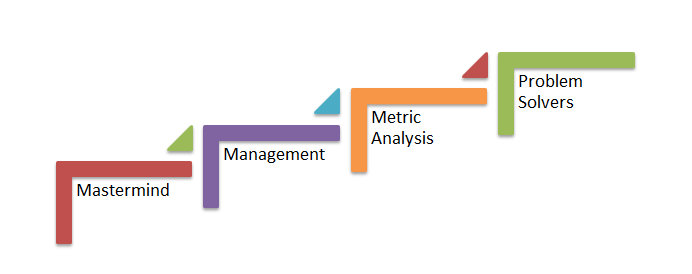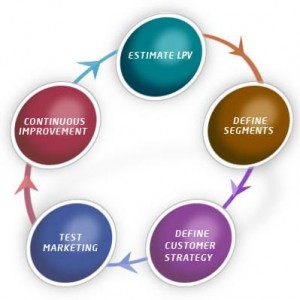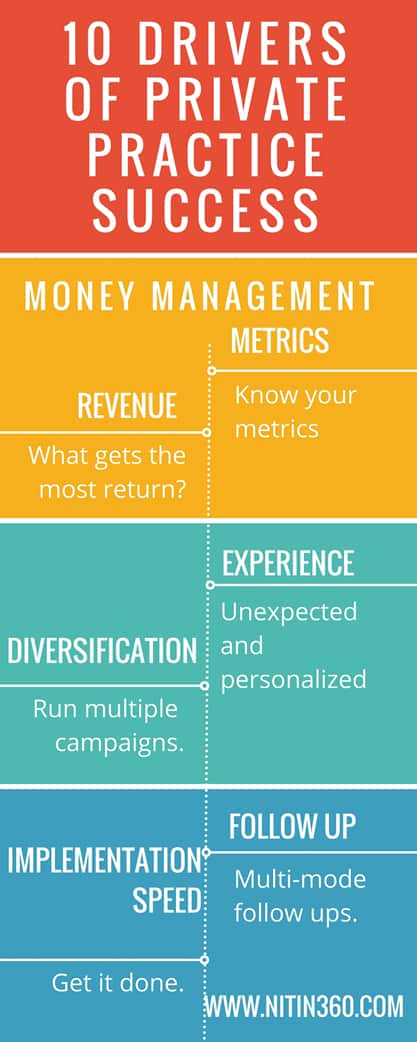As we start a new year in our clinics, it’s important to identify trends and new drivers of profitability in your clinic. A successful business is in a state of constant innovation, looking for new ways to improve customer experience and streamline operations. In order to establish new standards in profitability for your business, you need to master a new set of skills. Becoming a business manager first and a clinician second is the only way to grow a physical therapy business. Introducing the 7 most effective habits of a successful private practitioner.
1. Innovation: They are NOT “know it alls” and are always open to new ideas, new ways of learning (especially from other industries and experts). They have the right mindset for growth and success, and are constantly adapting to a new economy, changing times and evolutions in standards of care and marketing. They are always looking for new materials and resources to grow. They are experts at physical therapy management and know how to leverage themselves for quick and explosive growth. They are in a state of constant innovation.
2. Identification. They know EXACTLY what type of patient they want to work with and have systems in place to attract the RIGHT patients from the RIGHT referral sources while weeding out the rest. They are able to precisely define the average patient and create a patient ‘avataar’. They know the fears and frustrations, wants and aspirations and are conscious about exactly what the patient (and referral source) needs from them. They are able to deliver this in a systematic manner, with the right people on board and are able to build successfully, mutually beneficial, long lasting relationships.
 3. Investment. They invest in their marketing education and are able to measure their return on investment. For example, they are able to track that an investment of ‘x’ gets a return of ‘y’ and you only continue that particular strategy if ‘y’ is consistently greater than ‘x’. They are able to outspend their competition not because they like overspending, but because they know their business metrics so well that they can afford to go the extra mile, since they have a predictable, measurable return on investment.
3. Investment. They invest in their marketing education and are able to measure their return on investment. For example, they are able to track that an investment of ‘x’ gets a return of ‘y’ and you only continue that particular strategy if ‘y’ is consistently greater than ‘x’. They are able to outspend their competition not because they like overspending, but because they know their business metrics so well that they can afford to go the extra mile, since they have a predictable, measurable return on investment.
For example, if a new patient is worth $800 for your practice, and you had to spend $200 to acquire that new patient (something your competitors will not dream of doing), then you can outspend your competitors because you know your business metrics better than anyone else.
4. Mastermind. They create a nurture a successful group of mentors and associates whom they can count on to get answers to their most pressing questions. They are able to cultivate the right relationships with the right people, leading to SIGNIFICANT growth and new opportunities. These ‘right people’ are usually other successful private practice owners, experts in marketing and business development, employee productivity and billing/collections. They are able to approach such contacts (and colleagues) with a giving hand, and are able to add value to the world, instead of seeking to extract as much value as possible. In some cases, they may even seek to ‘model’ their mentors. They have no interest in ‘reinventing the wheel’ and are constantly looking to expand their circle of influence and interact with individuals who have better people and systems than they do, in an attempt to learn and get better themselves. They are a part of highly successful private practice mastermind groups.  5. Management. They are MASTERS at time management and people management. They know EXACTLY how to manage their day and focus on the high value tasks (people management, business systems and relationship building) that lead to growth in the business. They tend to look past the minutia, the day to day activities and frustrations that most people get bogged down with, and have a firm, determined attitude with insight and long term vision.
5. Management. They are MASTERS at time management and people management. They know EXACTLY how to manage their day and focus on the high value tasks (people management, business systems and relationship building) that lead to growth in the business. They tend to look past the minutia, the day to day activities and frustrations that most people get bogged down with, and have a firm, determined attitude with insight and long term vision.
 6. Metric Analysis. They can clearly define the lifetime value of a patient and tie it in with their business goals. Most practices have no idea what the lifetime value of a patients (LVP) means. The lifetime value (LVP) of a patient is the amount of profit you make from your patient during the lifetime of your relationship with them. It is a measure of:
6. Metric Analysis. They can clearly define the lifetime value of a patient and tie it in with their business goals. Most practices have no idea what the lifetime value of a patients (LVP) means. The lifetime value (LVP) of a patient is the amount of profit you make from your patient during the lifetime of your relationship with them. It is a measure of:
• How much you get paid for the average treatment.
• How many times a year the average patient schedules an appointment.
• How many of their friends they are likely to refer to you
• Your average net income per patient visit.
Most patients have a lifetime value of several thousand dollars. Successful private practice owners understand this and know that Repitition + Request = Referrals
7. Problem Solvers. They are not afraid to tackle difficult questions and seek solutions. A successful private practice owner has the ability to answer tough, insightful questions about his practice. He is able to answer questions like:
- What do I want to be known for / as?
- How much income would I like to make each year?
- How many patients do I need to see each week to reach that goal?
- How many therapists do I need to hire to reach that goal?
- Am I good or bad at employee management?
- How can I put systems in place to manage employees and achieve my goals?
- By which date should I achieve this goal?
- What additional products and services can I provide my patients so I can increase the lifetime value of each patient?
SOMETHING YOU MAY WANT TO KNOW:
I’m going to open up my 4 week coaching program called “Referral Ignition”, where I personally walk you through the ENTIRE process of referral generation, streamlining operations and building a 7 figure private practice. Register now before the seats run out. Don’t miss the opportunity.







